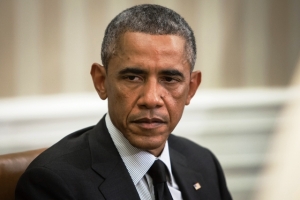
President Obama. (Shutterstock)
Famous human rights activist Natan Sharansky, a former political prisoner, is calling on world Jewry to fight the US administration on the Iranian nuclear deal.
Recalling world Jewry’s fight 40 years ago for the freedom of political prisoners in the Former Soviet Union, including his own, Natan Sharansky, chairman of The Jewish Agency for Israel and an internationally acclaimed human rights activist, is calling on Jews across the globe to stand up against the Obama administration on the nuclear deal with Iran.
In a Washington Post op-ed, Sharansky writes that “these days, like many Israelis and American Jews, I find myself in a precarious and painful situation.”
“Those of us who believe that the nuclear agreement just signed between world powers and Iran is dangerously misguided are now compelled to criticize Israel’s best friend and ally, the government of the United States. In standing up for what we think is right, for both our people and the world, we find ourselves at odds with the power best able to protect us and promote stability. And instead of joining the hopeful chorus of those who believe peace is on the horizon, we must risk giving the impression that we somehow prefer war.”
“As difficult as this situation is, however, it is not unprecedented,” he points out. “Jews have been here before, 40 years ago, at a historic juncture no less frightening or fateful than today’s.”
In the early 1970s, then-US President Richard Nixon inaugurated his policy of detente with the Soviet Union with an ambitious aim: to end the Cold War by normalizing relations between the two superpowers.
Among the obstacles Nixon faced was the USSR’s refusal to allow on-site inspections of its weapons facilities, just as Iran is now doing.
“Yet the Soviet Union, with its very rigid and atrophied economy, badly needed cooperation with the free world, which Nixon was prepared to offer,” according to Shransky. “The problem was that he was not prepared to demand nearly enough from Moscow in return. And so, as Nixon moved to grant the Soviet Union most-favored-nation status, and with it the same trade benefits as US allies, Democratic Sen. Henry Jackson of Washington proposed what became an historic amendment, conditioning the removal of sanctions on the Soviet Union’s allowing free emigration for its citizens.”
The administration in the White House at the time “objected furiously,” Sharansky explains. “It also claimed that by improving relations with Moscow, it would be better able to protect us personally and to ensure that some Jews could emigrate each year. This put Jewish activists inside the USSR in a difficult position. We feared opposing our greatest benefactor, yet we wanted freedom for all Soviet Jews, and we believed that would result only from unrelenting pressure to bring down the Iron Curtain. This is why, despite the clear risks and KGB threats, we chose to publicly support the amendment.”
American Jewry Made a Difficult Choice
“American Jewish organizations also faced a difficult choice,” Sharansky continued. “They were reluctant to speak out against the US government and appear to put the ‘narrow’ Jewish interest above the cause of peace. Yet they also realized that the freedom of all Soviet Jews was at stake, and they actively supported the policy of linkage.”
After a great battle and many threats by the Soviet regime, the amendment was passed. “By conditioning this assistance on the opening of the USSR’s gates, the United States would not only help free millions of Soviet Jews as well as hundreds of millions of others but also pave the way for the regime’s eventual collapse.”
“Today, an American president has once again sought to achieve stability by removing sanctions against a brutal dictatorship without demanding that the latter change its behavior. And once again, a group of outspoken Jews — no longer a small group of dissidents in Moscow but leaders of the State of Israel, from the governing coalition and the opposition alike — are sounding an alarm,” states Sharansky.
“Of course, we are reluctant to criticize our ally and to so vigorously oppose an agreement that purports to promote peace. But we know that we are again at a historic crossroads, and that the United States can either appease a criminal regime — one that supports global terror, relentlessly threatens to eliminate Israel and executes more political prisoners than any other per capita — or stand firm in demanding change in its behavior.”
“A critical question is, who, if anyone, will have the vision and courage” to lead this battle, Sharansky concludes.
By: United with Israel Staff

Sign the Petition to Stop a Nuclear Iran
The US Congress must ensure that sanctions against Iran remain in force until the nuclear threat is completely eliminated.
I strongly oppose easing sanctions before the nuclear threat from Iran has been eliminated. Allowing Iran to enrich uranium without being subject to 'anytime, anywhere' inspections is extremely dangerous and unacceptable. Iran's nuclear program must be stopped.
See our Privacy PolicyClick Here to Share the Petition with Your Friends
Click here to locate and contact your Senator.
Click here to locate and contact your Congressman.
